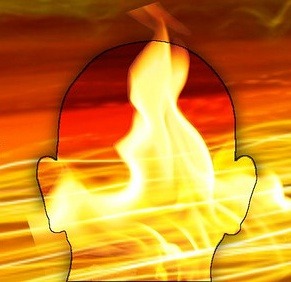 Last weekend Christians celebrated Pentecost, recalling the account in Acts 2 where the disciples heard a wind and saw tongues of fire that appeared above each others’ heads. They were filled with the Holy Spirit and suddenly able to praise God in other languages. Peter then shared the Gospel with 3000 people who were baptized that day.
Last weekend Christians celebrated Pentecost, recalling the account in Acts 2 where the disciples heard a wind and saw tongues of fire that appeared above each others’ heads. They were filled with the Holy Spirit and suddenly able to praise God in other languages. Peter then shared the Gospel with 3000 people who were baptized that day.
Many read Acts 2 assuming that the disciples were in the upper room when this happened. I used to imagine them cowering behind locked doors, trembling as they prayed together and waited in Jerusalem, according to their rabbi’s command.
But, Pentecost, or Shavuot, is one of the three major festivals which required their attendance in the Temple. At nine in the morning, they would have been gathered along with the crowds of Jews from every country who had come to the feast. So the Temple was filled with a sound of a mighty rushing wind, and the vision of tongues resting on them took place in front of thousands of other people.
Here in the Temple (and not in an upper room) Peter could speak to the multitudes of Jewish pilgrims about Jesus. To the south of the Temple stairs there are several dozen of ceremonial baths where new believers could be baptized. Next time you visit Jerusalem, you can stand on very steps where God’s Spirit was poured out on the early church.
Why on Shavuot?
 The feast of Shavuot is a harvest festival that also commemorated the giving of the covenant on Mount Sinai. On that mountain, God came down in fire and gave his ten commandments and established his covenant with his people (Exodus 19 – 20). God used that incredibly important experience in Israel’s life to begin his relationship with them, and he replays it here. It fits in perfectly with what God said he would do for his people in the future:
The feast of Shavuot is a harvest festival that also commemorated the giving of the covenant on Mount Sinai. On that mountain, God came down in fire and gave his ten commandments and established his covenant with his people (Exodus 19 – 20). God used that incredibly important experience in Israel’s life to begin his relationship with them, and he replays it here. It fits in perfectly with what God said he would do for his people in the future:
“The time is coming,” declares the LORD, “when I will make a new covenant with the house of Israel and with the house of Judah.
“I will put my law in their minds and write it on their hearts. I will be their God, and they will be my people. No longer will a man teach his neighbor, or a man his brother, saying, ‘Know the LORD,’ because they will all know me, from the least of them to the greatest,” declares the LORD. “For I will forgive their wickedness and will remember their sins no more.” (Jeremiah 31:31, 33-34)
On Shavuot of this important year, God poured out his Spirit as part of his New Covenant. Why? Because the only way to become part of the new covenant is through faith in God through Christ.
This Holy Spirit entered the believers’ hearts to guide, convict, correct, give wisdom and enable them to live the way God wanted them to, just as his Torah (Law, or Instruction) did in the first covenant. And all of those who are a part of this new covenant know the Lord, from the least to the greatest.

~~~
(Photos: departingyyz, tenchi042, rachelfordjames)
Joy says
shhh don’t let it out that this happened in the Temple. It will be a shocker to many that the Holy Spirit actually showed up in the Jewish Temple. gasp!
Rena says
I just had a conversation with a couple of ladies about this very thing. They both say the Bibles says in the Upper Room. Thank you for the clarification.
Melanie says
Thank YOU Jesus for keeping Your promises. You said You would come and You did. You said you would suffer for many, and You did. You said You would rebuild the temple in three days, and You did. You said You would return to Your Father, and You did. You said You would send the Spirit, and You did. You said You will come again….and we believe!!!
Don Johnson says
I gave this explanation to a person wondering about the temple location for Acts 2 and thought it would be useful to post here also.
This is one of those tricky things where one can read Scripture as a Greek or as a Jew.
Many people are taught that the tongues of fire happened in the upper room, but the Bible does not actually say that.
ESV Act 1:13 And when they had entered, they went up to the upper room, where they were staying, Peter and John and James and Andrew, Philip and Thomas, Bartholomew and Matthew, James the son of Alphaeus and Simon the Zealot and Judas the son of James.
ESV Act 2:1 When the day of Pentecost arrived, they were all together in one place.
See the Scripture4all pdf, what the Greek says is they were “all in the same” with “place” implied. That is, where ever they were, they are all together. It is an open question as to where this actually was.
But from a knowledge of Jewish culture as a background worldview (like Lois teaches) on Shavuot the “place” where everyone would gather that could would be in the temple. That is, using normal Jewish assumptions about what a Jew in Jerusalem would be doing during the Shavuot festival places them all together in the temple.
Don Johnson says
ESV Act 2:2 And suddenly there came from heaven a sound like a mighty rushing wind, and it filled the entire house where they were sitting.
For the English word house in the above the Greek word is oikon and oikos is the basic form.
Strong’s G3624
οἶκος
oikos
oy’-kos
Of uncertain affinity; a dwelling (more or less extensive, literally or figuratively); by implication a family (more or less related, literally or figuratively): – home, house (-hold), temple.
So one can see that temple is one possible meaning of oikos. It was considered the house of God, for example.
Lois Tverberg says
Don –
Thanks for your comments and study of the word “oikos.” It clearly parallels the Hebrew word “bayit” which means house/temple/family.
Even today, the Temple Mount is called “HaHar HaBayit” (“the mountain of the house”), and “the house” is understood as a reference to the Temple.
Jesus also refers to it as the “house” (oikos, in Greek) in Matthew 12:4 and Matt 21:13, “My house is to be a house of prayer…”
That’s a good observation that in Acts 2:1, the word “place” is inferred. They were all together, though. I imagine that it means that among the throngs of people who had gathered in the Temple courts to worship, the believers were clustered in one area. (Remember, later they used to meet regularly in the Temple courts.)
When the rest of the crowd saw the tongues of flame alight on the believers, that’s part of what drew their attention, along with hearing them speaking in other languages. Of course that was the moment Peter turned to preach to them, and many became believers.
Don Johnson says
Yes, I agree.
I think I will add this to my Bible Quiz as it is one of those areas where tradition about what the Bible says can impact our ability to actually see what it says and implies.
Lois Tverberg says
Don (and the rest of you),
I just wrote a follow-up post to this, called “Tongues of Flame at Pentecost – What for?”
After I learned about Pentecost occurring in the Temple and started to read other Jewish traditions about it, more connections surfaced. They make Acts 2 much more clear.
Ron says
The commentary of the Expositors Study Bible, Jimmy Swaggart, 2005 make the same point that you are making in reference to the place of the outpour.
Lois Tverberg says
Ron, thanks. I wouldn’t be surprised. A lot of scholars have known this, even though people in the pews haven’t heard.
Gloria Phillips says
Other comparisons with the link to Sinai and Shava’ot are:
fire on the mount; fire on heads of believers. Supernatural speaking of God’s voice; supernatural speaking of Holy Spirit through human voices. Law written on stone; law written on hearts. Three thousand slain after Moses descended; three thousand saved after Holy Spirit descended.
Three major Feasts of the Lord comparable to three major experiences Jesus had and fulfilled and that believers are expected to have in individual experiences. Second garment of the priest was seamless, blue [from heaven], had to be slipped over the head and went to knees with bells/pomegranates equal distribution of gifts and fruit for believers. Over head as sense and reason are against the Holy Spirit states the Amplified version. Second unit of Tabernacle/Temple was where supernatural was evident by Cherubims embroidered on the curtain in that area as the first thing seen when entering in. Light of Menorah furnished by oil that burned priest’ discarded clothing cut into strips. And that original supernatural light shone over on the “Bread of His Open Face” to give revelation on the Word. This bread [scripture] was placed on the North side, from whence Israel was most often attacked, thus it’s weak side. Application, the bread of the Word is to be placed as a fortifying element against the side from which the enemy most often attacks us, our weakest side.
Chuck Adkinson says
It doesn’t say in ch 2, but knowing Jewish background, I would say the 3000 were out on the temple steps, because the Jews were already IN the temple for the celebration. In the KJV in ch 2 it says nothing about the upper room.
I enjoy your work, Miss Lois. I’m also a fan of RVL’s.
Willaim says
From a Hebraic standpoint is the ruach ha Kodesh a 3rd person or “breath of YA”WY” speaking, inspiring, not a 3rd person as Protestantism teaches?
Janet Hughes says
Lois, did you respond to Willaim’s question on 6/8/2014. If so, would you mind sharing?
Lois Tverberg says
Janet, the Old Testament often speaks about God’s Spirit coming upon a person, and it also prophesies that the Spirit of God would be poured out in a powerful way in the Messianic era. That’s just what we see throughout the New Testament. What exactly is the relationship between the Spirit that was poured out to God the Father and Jesus? I don’t know, but what I do know is that all three are very much a part of the biblical witness.
So what is the Hebraic standpoint on the question above? Simple. The very question is amazingly Greek — it presumes that we can and should “figure God out.” To dissect and debate God’s nature is very much of the style of Greek philosophy. The goal of it was to spend one’s life speculating on heavenly matters in order to divorce one’s self from earthly reality. That’s what many Christians have done through history, and what this question continues to do.
The Hebrew attitude is to approach the God who has revealed himself in Scripture with awe and wonder, and ask how we can love and serve him, and bear witness to Christ. Way too much time has been spent on useless debate on things like this.